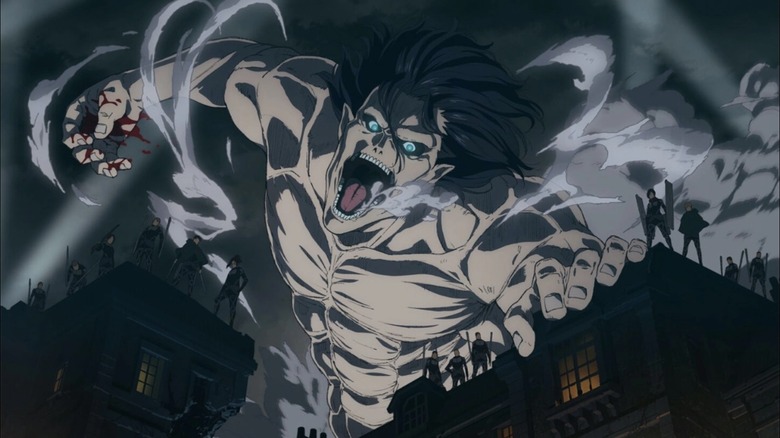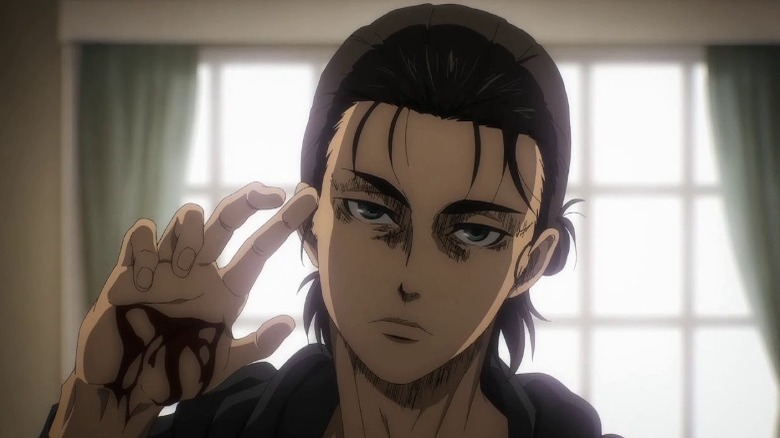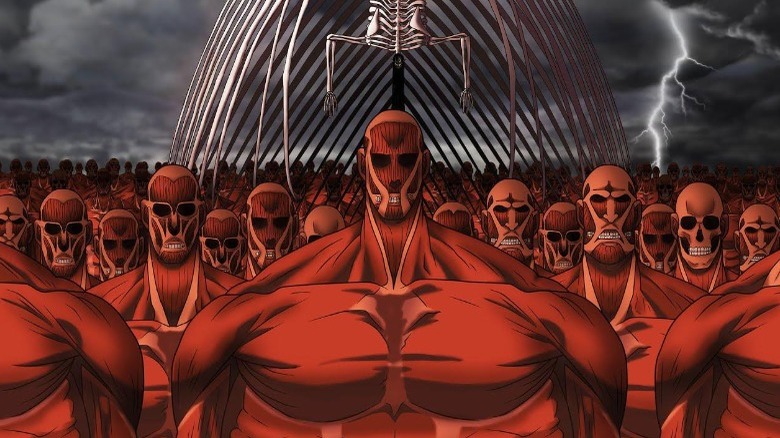Isayama Created Attack On Titan At 19 As A 'Prototype'
Hajime Isayama's "Attack on Titan" is more than a long-running pop culture phenomenon. Taking the world of anime by storm since its serialized television adaptation in 2013, "Attack on Titan" has proven its enduring appeal with its gripping world-building, complex, fleshed-out characters, and one of the most compelling anime anti-heroes of all time, Eren Yeager. After almost a decade of incredible storytelling, "Attack on Titan" has (almost) come to a close with Part 2 of "The Final Season," which doubles down on the show's bleak, existentialist themes and squashes all hopes of a happy ending. However, these uncompromising undertones only serve to add to its many strengths while definitively carving out a space for "Attack on Titan" as a landmark anime that thoroughly deserves its global acclaim.
If one were to delve deeper into Isayama's source material, it becomes abundantly clear that the world of "Attack on Titan" is a deliberate, meticulous setting meant to shape the characters that inhabit it, and not the other way round. A world riddled with enormous human-eating Titans is bound to leave some deep-seated emotional wounds, and this, combined with individual instances of trauma, molds character choices and the paths they end up taking. In an interview with culture magazine Brutus, Isayama clarified that he had spent half a year perfecting the manga's world-building, and had already formulated an ending way before the story was in motion.
In truth, though, the roots of the manga can be traced back to a 65-page one-shot Isayama had written when he was only 19, which served as the "prototype" for the critically-acclaimed manga series that later become a cultural juggernaut.
A creative jumping-off point
Hajime Isayama's prototype, also titled "Shingeki no Kyojin" (Attack on Titan), started off as a one-shot loosely outlining the world of the manga and the anime that fans are so intimately acquainted with. In the interview with Brutus, Isayama said that he had intended the story as a one-shot, which had won him his "first-ever prize," and he had not given it serious thought until he was 22 or 23. Isayama's editor, Shintaro Kawakubo, had asked him to "consider making that old one-shot into a long-term series," which kickstarted the process of writing/drawing "Attack on Titan."
We obviously have Kawakubo to thank for urging Isayama to expand on the one-shot concept into a full-fledged serialized storyline, which went on to morph into a dense, politically charged saga about personal transformation and complex morality. After spending some time filling out the details of such a treacherous, dystopian world where humans live inside walled enclaves to keep out Titans of numerous kinds, Isayama launched the manga series in Kodansha's monthly magazine "Bessatsu Shōnen Magazine." The rest is history — the serialized manga received critical and commercial acclaim even before it was picked up by Wit Studio (and consequently, MAPPA) for a live-action adaptation.
It is interesting that Isayama consistently undercuts his own accomplishments throughout his interview with Brutus, while vocalizing his initial fears of disappearing into a "forest" of run-of-the-mill manga artists with stories that champion standard narrative tropes and themes. Although there is nothing run-of-the-mill about "Attack on Titan" — from its unique world-building to its lore-heavy, thought-provoking storyline — Isayama seems to underestimate the impact of his greatest work, which can be traced all the way back to his one-shot. Still, this does grant us a glimpse into the manga-ka's creative thought-process while the series was conceived.
Make memorable art, even if it's bad
Hajime Isayama also shed light on the series' greatest antagonists, The Titans, and the reasons behind their terrifyingly grotesque designs. The manga-ka attributed the "ugly" designs of the Titans to the way he etched doodles in junior school, where this brand of ugliness was "idiosyncratic" to his art style. Of course, there's more depth to this approach than Isayama humbly let on, as the specific designs of individual Titans underline their brutality and accentuate who they were as people before their transformation. While Isayama described his recent work as "awkward," it is, in fact, this unaffected awkwardness that lends authenticity to the story, which would've otherwise been tricky to pull off without this distinctive characteristic.
Isayama seems to be his biggest critic, holding on firmly to the belief that "Attack on Titan" happened to catch on for some reason, and that his characters can never be as cool/carefree as the ones created by those he admires. This is partly true — characters like Eren and Mikasa can never shed the weight of their circumstances and blossom into healthy, well-adjusted beings, or dare to dream about happiness in the near future. However, this does not make them any less cool; if anything, their pathos and complexity paint them as relatable figures worth rooting for, even when they make choices that are deemed morally vacuous from a traditional point of view.
To my delight, Isayama also said that it is "better to have memorable art, even memorably bad art, and stand out" as opposed to never trying due to a fear of being lost in the shuffle. Thankfully, the manga-ka took his own advice when he was 19, and created the foundation for one of the greatest sagas about endurance in the face of terror.


